ROBERT WILLIAMS BUCHANAN (1841 - 1901)
|
ROBERT WILLIAMS BUCHANAN (1841 - 1901) |
|
|
|
|
|
|
|
|
{North Coast and other Poems 1867}
103 |
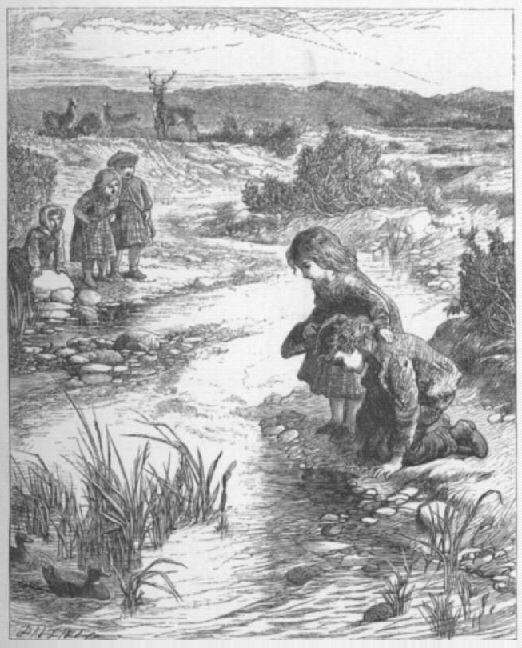 |
|
OH, sweet and still around the hill O Brook, he smiled, a happy child, O Brook! in song full sweet and strong And when at last the sleepers cast 105
[Notes:
106 (NORTH COAST.)
SKIES are dusky, winds are keen, All is dark across the night, What are those that in the air Falling flakes of snow they seem, Round and round they wind and wind,— Child, wish now! while thou canst see! 107 O’er thy shoulder peep; and so Once a year, on Hallowe’en, Thus round happy farms they fly, Lad and lass, to-night beware! * * ‘Ah, bairns, my bairns, forbear on Hallow Night ‘Aye please the fays! ’tis easy if ye will; |
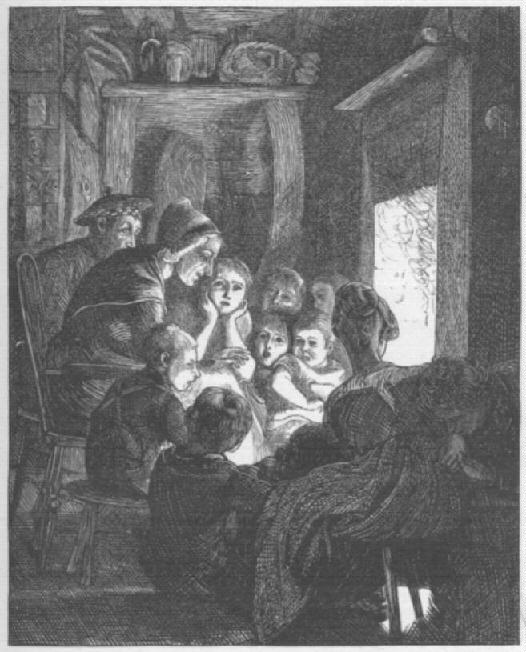 |
|
Or grandfather had ne’er prevailed on me ‘For, though I say it, bairns, my face was fair, 110 ‘Yet oft I tried to picture in my brain * * Round the happy farm they flee,— Near the peat-blaze range in ring; 112 In the great tub duck the head Slyly let each pair by turn Love who never loved before,— Lad and lass, to-night beware! * * ‘O bairns, we gathered round the blazing peat, ‘James West was there, the Laird, and many more, ‘Oh, Hallowe’en in those old times, I vow, ‘There in the chimney shadow, pale and sad, ‘Louder the fiddler, warmed with many a glass, ‘But, bairns, ’twas near the hour when ghaists are said * * Lad and lass, to-night beware! Winds are crying shrill, and, hark! Who will dare this Hallow Night 117 Who will dare to stand alone, Who this night is free from fear? * * ‘Dark, dark was all, as shivering and alone ‘O bairns! what would my foolish heart have gi’en ‘Thud, thud against my breast my wild heart leapt, |
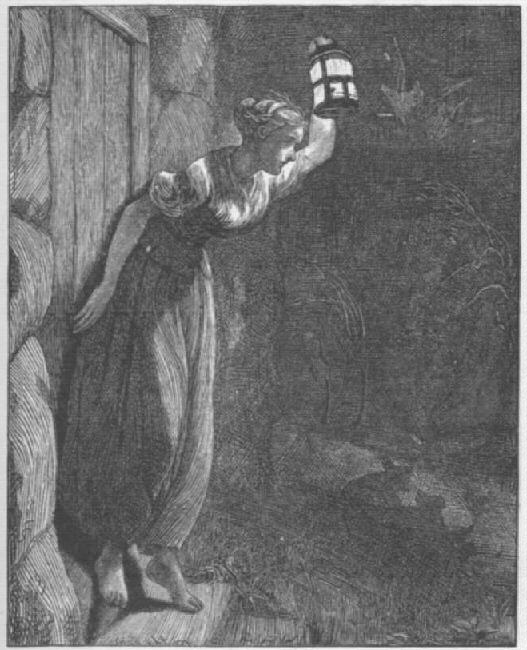 |
|
‘Then setting down the lanthorn on the ground, * * Lightly soon shall rise the sun! Fiddler, put your tools away, Lads and lassies, flushed and red, 121 Maiden, thou hast heard and seen Thou hast wished to hear and see— Sad or merry, ill or well, In among the blankets creep— Wake and smile with heart resigned! * * ‘Oh, bitter was my heart, my wits amazed; ‘O bairns!—what further tale have I to tell? ‘Ah! heed not, bairns, though grandfather should swear
[Note:
124 (SCANDINAVIA.)
THE widow on the storm-tost shore of Denmark had her home, To Him whose white foot stills the waves and bids the storm be done, ‘See, mother, mother!’ cried the lad, ‘thou hast not land nor gold; 125 And sticking in his cap a sprig of green, he kissed her lips, Three years she waited wearily, and watched with weary eyne, Ah, little one! ah, wilful one! now are ye fast asleep! 126 To kirk she hied full wearily upon each holy day, Then to the hut she weeping turned, and wearied on once more, For every autumn on the roof he stood and waved his wing, 127 And now the widow saw him rise, less fleet of wing and strong, ‘Perchance thy sharp round eye hath seen what still is hid from me— How! powerless? GOD’s mild will to work what thing is quite unmeet? 128 He heeds not yonder sweet-eyed slave, who smiles to soothe his pain, But suddenly he stares amazed, for near him on the sand, |
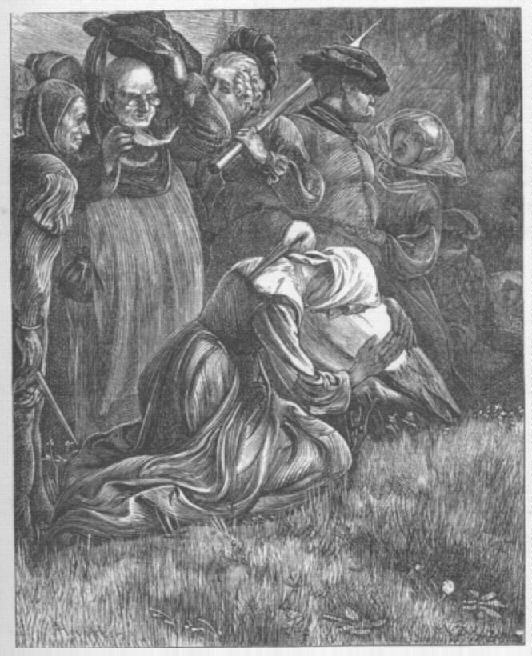 |
|
‘Ah! could it be indeed my old brave comrade travelling? ’Tis spring again in Denmark, and all is green once more, It is the Stork, the ancient Stork,—he lights upon the ground: ‘O mother, here I dwell alive, but held in slaverie, Oh, who that Sabbath was so pinched as grudge from out his store Now in his mother’s hut again the sailor sits once more,
132 (MEDIÆVAL.)
THE sedgy shores of this enchanted lake I stand alone beneath heaven’s silent arch, |
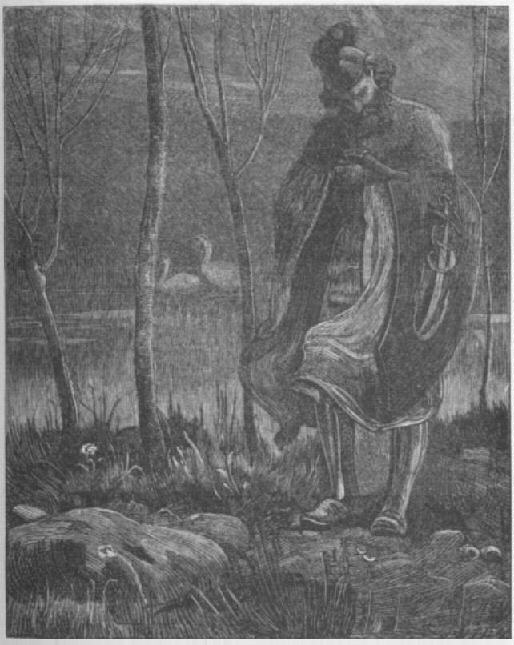 |
|
This is a place where mortals find not speech; Nought can redeem her. Wherefore I seek grace For, having worn her stainless badge in fight, Arméd from head to heel, with spear in hand, 135 She bathed my bloody brow, with red wounds striped, Wherefore my soul again was strong. I caught I wooed her night and day with virtuous deeds, Twined closely, down the soft descent of love Here on the beach we stood, and hand in hand |
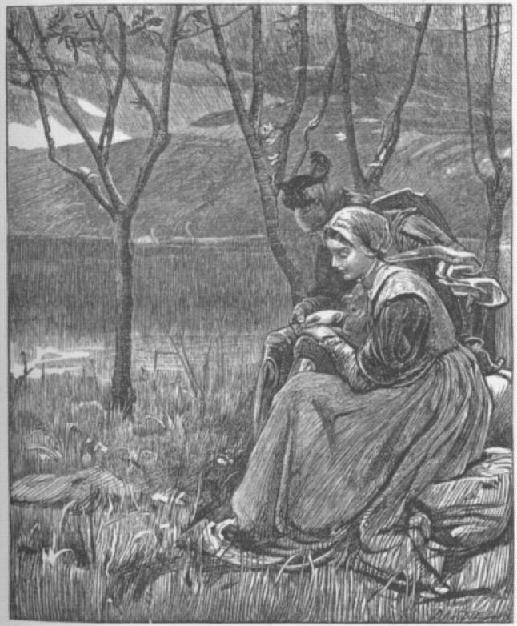 |
|
And all the shore was dark; She said, ‘The waters make such threatening moan, Then in the distant waves we could behold I laid her down upon a flowery bed, Yea, nearer, nearer grew the light, and soon, They clustered with a ghostly light around And then I shrieked in utter agony; 140 Long have I waited here, alone, alone, This lonely watching would invite despair Twice has the barge returned: once for a bent Twice has the mystic barge returned, and twice And I will wait. To slay myself were sin, And fall to slumber on a bed of weeds,
[Note:
143
I. I WOULD not be lying yonder, Better this fierce pulsation, Than lie in the kirkyard lonely, * David Gray, Author of “The Luggie, and other Poems.” 144 I would not be lying yonder, For the eyes are blinded with mildew, The brain is warm and glowing, Ay! down in the deep damp darkness Each like a faint lamp lighteth I would not be lying yonder 145 If the brain like a thing that breatheth And the hope that sweetened living And the dreams are heavy with losses, There’s only the slow still rolling ’T is cold, cold, cold and weary, 146 What matter the tingling fingers Nought has been said and uttered,
II. Yet ’t is dark here, dark, ’T is dark, dark, dark, 147 And yonder the sun is shining, The world is heartless and hollow, Were thy lips to mine, belovéd, The flesh and the bones might wither, And the world with its slow still motion 148 _____
North Coast and other Poems continued or back to North Coast and other Poems - Contents
|
|
|
|
|
|
|